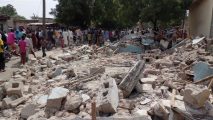Categories
Recent Posts
- CPDM Covid Scandal: Prosecutor seeks 10-Year ban for 4 officials
- Cameroon still faces power cuts despite full output from Nachtigal Dam
- Financial scandal rocks Mkpot Oil Mill Project!! Manyu Chiefs won’t talk
- Yaoundé: Defense Ministry says “Clear Alliance” between Boko Haram and criminals in recent attack
- Football: MTN Elite One resumes after boycott threats
Archives
- March 2025
- February 2025
- January 2025
- December 2024
- November 2024
- October 2024
- September 2024
- August 2024
- July 2024
- June 2024
- May 2024
- April 2024
- March 2024
- February 2024
- January 2024
- December 2023
- November 2023
- October 2023
- September 2023
- August 2023
- July 2023
- June 2023
- May 2023
- April 2023
- March 2023
- February 2023
- January 2023
- December 2022
- November 2022
- October 2022
- September 2022
- August 2022
- July 2022
- June 2022
- May 2022
- April 2022
- March 2022
- February 2022
- January 2022
- December 2021
- November 2021
- October 2021
- September 2021
- August 2021
- July 2021
- June 2021
- May 2021
- April 2021
- March 2021
- February 2021
- January 2021
- December 2020
- November 2020
- October 2020
- September 2020
- August 2020
- July 2020
- June 2020
- May 2020
- April 2020
- March 2020
- February 2020
- January 2020
- December 2019
- November 2019
- October 2019
- September 2019
- August 2019
- July 2019
- June 2019
- May 2019
- April 2019
- March 2019
- February 2019
- January 2019
- December 2018
- November 2018
- October 2018
- September 2018
- August 2018
- July 2018
- June 2018
- May 2018
- April 2018
- March 2018
- February 2018
- January 2018
- December 2017
- November 2017
- October 2017
- September 2017
- August 2017
- July 2017
- June 2017
- May 2017
- April 2017
- March 2017
- February 2017
- January 2017
- December 2016
- November 2016
- October 2016
- September 2016
- August 2016
- July 2016
- June 2016
Featured
Most Commented Posts
 4 Anglophone detainees killed in Yaounde
4 Anglophone detainees killed in Yaounde
18 comments Chantal Biya says she will return to Cameroon if General Ivo Yenwo, Martin Belinga Eboutou and Ferdinand Ngoh Ngoh are sacked
Chantal Biya says she will return to Cameroon if General Ivo Yenwo, Martin Belinga Eboutou and Ferdinand Ngoh Ngoh are sacked
13 comments The Anglophone Problem – When Facts don’t Lie
The Anglophone Problem – When Facts don’t Lie
12 comments Anglophone Nationalism: Barrister Eyambe says “hidden plans are at work”
Anglophone Nationalism: Barrister Eyambe says “hidden plans are at work”
12 comments Largest wave of arrest by BIR in Bamenda
Largest wave of arrest by BIR in Bamenda
10 comments
Latest Tweets
Featured
-

CPDM Covid Scandal: Prosecutor seeks 10-Year ban for 4 officials
-

Cameroon still faces power cuts despite full output from Nachtigal Dam
-

Financial scandal rocks Mkpot Oil Mill Project!! Manyu Chiefs won’t talk
-

Yaoundé: Defense Ministry says “Clear Alliance” between Boko Haram and criminals in recent attack
-

Football: MTN Elite One resumes after boycott threats
-

Biya’s election season stirs renewed anxiety in Southern Cameroons
-

Revealed: Boko Haram fighters kill 20 Cameroonian troops
© Cameroon Concord News 2025





22, September 2024
Roman Catholic clerics urge support after devastating floods in West and Central Africa 0
Catholic leaders across West and Central Africa are calling for assistance following unprecedented and deadly floods that have swept through the regions.
The catastrophic flooding in Nigeria, Cameroon, Niger, Chad, Mali, Ghana, and Liberia has triggered severe humanitarian crises, affecting an estimated four million people, most of whom are children.
As of 17 September, the United Nations Population Fund (UNFPA) said that at least 341 people had died due to the floods that have also affected nearly 1.5 million people.
Bishop Dominique Tinoudji of the Diocese of Pala in Chad has urged the population not to despair, reminding them that “God is still on the throne.”
In a September 8 Mass dedicated to the flood victims, the bishop noted that “the situation we face might lead us to question God’s presence, His protection, and His help; but even in the face of such a severe trial, we must not give up hope.”
The bishop called Christians to action, urging them to make sure the new shelters now called home by the millions displaced by the floods do not constitute a source of fresh problems for the people.
“We must safeguard hygiene to prevent disease and protect the vulnerable from the cold and malaria-carrying mosquitoes,” Tinoudji said.
“We are one body in Christ, and individually member’s one of another. Opening your hand to give a kilogram of rice, some maize, or a bar of soap can make a huge difference,” he continued.
He emphasized the importance of supporting local Caritas organizations to ensure a coordinated disaster response.
“Caritas is our way of putting charity into action. Unfortunately, in many parishes, Caritas is either inactive or absent. Even our diocesan Caritas is still in its early stages,” the bishop said.
The Catholic Church leader encouraged communities to take “practical steps in city planning to reduce future risks, particularly in flood-prone areas.”
“Our engineers must help us design cities that consider natural water pathways, flood-prone areas, and proper drainage systems,” the bishop said and reiterated his call to trust in God’s continued presence, saying, “Do not be afraid; be strong and keep your trust in the Lord.”
In Nigeria, at least 269 people are reported dead and more than 640,000 people displaced, according to the latest data from the country’s disaster management agency NEMA.
The flooding in Nigeria was caused by the collapse of a dam following heavy rainfall. There are also concerns that there will be even more flooding in the days ahead as Cameroon plans to release water from the Lagdo Dam in the country’s Far North Region.
Nigeria’s hydrological services agency has warned that 11 states would potentially be flooded as a result.
The Catholic auxiliary bishop of Maiduguri – located in Nigeria’s Borno state that has been most affected by the floods – has in a video message noted that “the city of Maiduguri has been engulfed with a devastating flood and over 40 percent of the city is under water.”
In comments to Crux, the Episcopal Secretary for Laity Affairs of the Catholic Secretariat of Nigeria, Josef Iorakpen Ishu, noted that “the flood regime in Nigeria is heartbroken.”
“The flood that is ravishing some parts of the country is compounding the hardship on the people. In fact, the metrology agency is predicting that more states will experience flooding in days and weeks to come, and the government is asking those living in such areas to vacate immediately,” he told Crux.
“The question is should people vacate where? Because the same government has not provided alternative homes or makeshift homes for the people,” he said.
“Even humanitarian agencies are overwhelmed by the situation. It is a huge challenge for us here,” Ishu added.
Then referencing the recent End Bad Governance Protest in Nigeria, Ishu said the government’s response to the floods is just further proof that it has “lost its relevance at all levels: Federal, state and local levels.”
“People are helpless and looking up to God for divine intervention,” he said.
“We are reaching out to our friends at Aid to the Church in Need for your prayers, especially at this difficult and challenging time,” the Bishop of Maiduguri said in a video message.
In Cameroon, where the UN says at least 17 people have died, the government has offered assistance in terms of basic items like blankets, soap, and buckets.
In Niger, over 137,000 people have lost their homes due to flooding since August. Almost 100 deaths have been recorded.
“The situation [in West and Central Africa] is devastating — people in the region are already grappling with rising hunger and alarmingly high malnutrition,” said Modou Diaw, the West Africa Vice President for the International Red Cross.
Climate change is now blamed for the floods, triggering calls for a response to the high cost Africa pays due to the issue.
“Africa is losing an estimated 2-5 percent of its GDP annually due to climate-related disasters,” said Dr. Richard Munang, Africa Regional Climate Change Coordinator at the United Nations Environment Program (UNEP) in comments to Crux.
“For instance, adaptation costs in sub-Saharan Africa are projected to reach $30-50 billion annually over the next decade,” he said.
Source: Crux